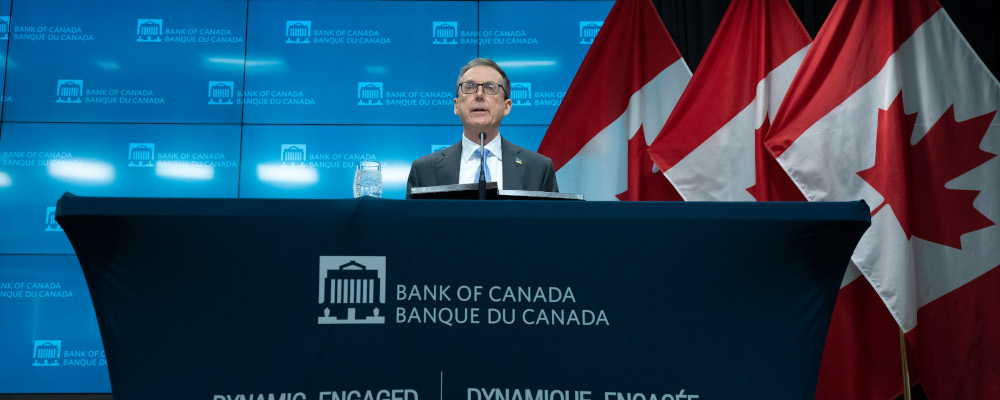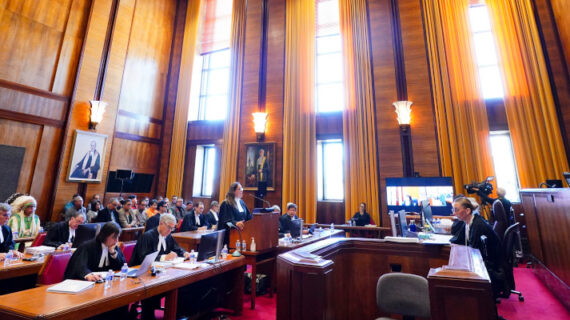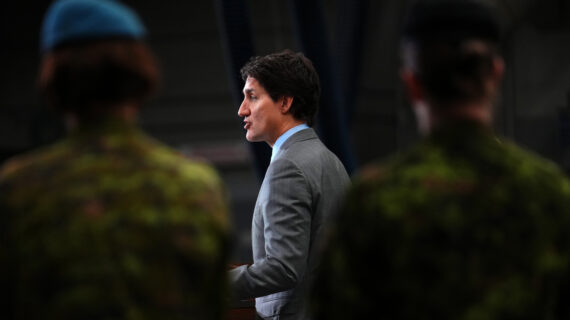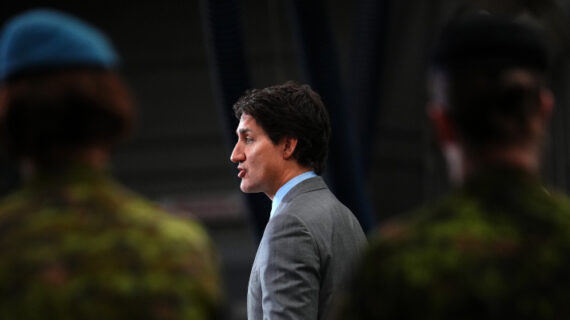Canadians are stressed about the economy. You don’t need mountains of polling data to figure that out. But dig into the work of Canada’s pollsters and you’ll find only 14 percent of people say they are better off financially than they were a year ago and, even worse than that, many Canadians don’t see any relief on the horizon. What can we do about this? In this five-part Hub series, we’re digging deeper into the economy, identifying our country’s fiscal problems, but also offering solutions to our monetary malaise.

Conservative leader Pierre Poilievre’s leadership campaign last year was propelled by a savvy prediction that interest rates and inflation were about to dominate the Canadian political discourse.
As leader, Poilievre has doubled down on the issue, bemoaning the price of consumer goods and relentlessly criticizing Bank of Canada governor Tiff Macklem.
That impulse has now gone mainstream, with even progressive politicians grumbling about the Bank’s recent rate hikes and decrying the effect on Canadian family budgets.
Ahead of the Bank of Canada’s rate decision on Wednesday, Ontario Premier Doug Ford even took a cue from his B.C. NDP counterpart David Eby this weekend by demanding a halt to rising interest rates, urging Macklem to consider the effect on “everyday people.” Eby had made a similar plea days earlier.
But discerning listeners would have noticed that, contrary to the usual populist impulse to tear down institutions, Poilievre’s complaint was that the Bank wasn’t respecting its long institutional history of indepence and was succumbing either to partisan behaviour or groupthink.
Poilievre says the policies pursued by the Bank went beyond its mandate by effectively helping to finance the Liberal government’s deficit spending during the pandemic that has brought Canada’s federal debt to the deepest level in its history.
The total federal debt now stands more than $1 trillion which is nearly double were it stood in 2015. Most of this growth is the result of Ottawa’s pandemic spending which took the debt from $721.3 billion in 2019-20 to $1.1 trillion last year.
Philip Cross, a senior fellow at the Macdonald-Laurier Institute and former chief analyst at Statistics Canada, said the Bank should’ve known this was a recipe for a wave of criticism.
“I think it’s unfair to accuse the bank of partisanship in the current circumstance,” says Cross. “But you know, on the other hand, it has adopted policies that have allowed it to be accused.”
How groupthink happens
A more accurate accusation than partisanship, according to Cross and other central bank critics, is that groupthink has clouded the judgment of central bank governors. Bankers may have learned the wrong lesson from recent downturns, setting the stage for the recent burst of inflation.
Mark Carney was the Bank of Canada’s governor during the 2008-2009 financial crisis, often referred to as the “Great Recession” and his leadership is credited with helping the Canadian economy effectively sustain and recover from that crisis.
Cross, however, says the Bank’s success in 2009 might have made it vulnerable to groupthink. He also says Carney pioneered Forward Guidance, a policy where central banks publicly predict an economy’s future direction, and indicate what interest rates will be going forward.
“I think it’s unfair to accuse the bank of partisanship in the current circumstance. But you know, on the other hand, it has adopted policies that have allowed it to be accused.”
Philip Cross, senior fellow at the Macdonald-Laurier Institute
Forward Guidance was intended to make central bank decisions more transparent but Cross believes it made the Bank and Macklem feel bound to keep the promise it made in 2020, when inflation has not yet taken off, to keep interest rates low for the foreseeable future
“The triumphs of the previous cycle lay the seeds for the errors made in the current cycle,” says Cross.
Groupthink within the leadership of central banks is a major problem, says David Blanchflower, a professor of economics at Dartmouth College who formerly served on the Monetary Policy Committee of the Bank of England, which is responsible for voting on the yearly interest rates for the United Kingdom.
Blanchflower says he was often the only dissenting voice on the nine-person MPC when it came to voting on monetary policy decisions. He says that in 2007, he had seen signs of a recession in the U.S., and urged the MPC to lower interest rates before the economic downturn hit the U.K.
“We got to October 2008 and the other members of the committee hadn’t spotted that Lehman Brothers failed,” recounts Blanchflower. “Nine months after the U.S. was in recession and six months after every other country in Europe was in recession, and they still hadn’t spotted it.”
According to Blanchflower, Gordon Brown, the U.K. prime minister at the time, had privately told him that he agreed with Blanchflower’s grim assessments of the economy. Nobody else on the MPC, which Blanchflower says lacks a diversity of opinion, seems to have also agreed with him.
Blanchflower likens many central bank leaders to U.K. politicians, many of whom completed a degree at Oxford together before entering politics.
“Everybody else (on the MPC) essentially has the same background: professor of economics who lives in London, a civil servant, a bank insider, none of whom walk the streets of Pittsburgh, Liverpool, or Glasgow,” says Blanchflower.
He points out there have been no dissents by a U.S. Federal Reserve chairman, who helps vote on U.S. interest rates, since the time of Alan Greenspan, who served as chairman from 1987 to 2006.
Of the last five Bank of Canada Governors, only John Crow, who resigned in 1994, did not receive a PhD in economics.
Although it’s true that central bankers tend to have similar educational backgrounds, it is important to have people who deeply understand economic data making monetary policy decisions, says Christopher Ragan, an associate professor and founding director of McGill University’s Max Bell School of Public Policy. Ragan also served on the Advisory Council on Economic Growth for former Finance Minister Bill Morneau from 2016 to 2019.
“Everybody (at a central bank) essentially has the same background: professor of economics who lives in London, a civil servant, a bank insider, none of whom walk the streets of Pittsburgh, Liverpool or Glasgow,”
David Blanchflower, professor of economics at Dartmouth College
“I think you can criticize the Bank of Canada, not so much for the makeup of its governing council, but to what extent they bring outsiders,” says Ragan. “I think you could absolutely have a reasonable debate about whether they should open it up more…I tend to think that openness to different views is a very good thing.”
Blanchflower says central bank leaders, like the MPC, need regional representation from people engaged in the “real” economy.
“Economists have been pretty terrible; they missed the Great Recession, they haven’t been that helpful,” says Blanchflower.
Cross says the Bank’s growing focus on matters outside its mandate, such as combating climate change and aiding reconciliation with Indigenous communities may have distracted it from fully pursuing its prescribed mission of keeping inflation stable.
The Bank has publicly stated it has a role to play in contributing to reconciliation with Indigenous peoples. Its proposals to combat climate change are largely geared towards making Bank of Canada facilities carbon-neutral and printing environmentally friendly dollar bills.
“I think the bank should be focused exclusively on maintaining low rates of inflation,” says Cross. “Getting rid of these extraneous things in the future hopefully will be a reminder, and help the bank focus on the only thing that should matter to it.”
Blanchflower says the repeated failures of central banks around the world, largely due to groupthink, have led to reassessments about the arguments for central bank independence.
“We need to be concerned about central bank independence when they get things wrong, so it’s perfectly reasonable for people to think about that,” says Blanchflower. “We have to have a rethink about how we make sure…not necessarily that it’s independent, but that it makes decent decisions, which it hasn’t done.”

Independence still matters
Poilievre has been accused of undermining the Bank and putting its independence into doubt by threatening to fire Macklem and many experts have argued that the Bank’s independence is vital to its ability to keep inflation low.
Some point out, though, that full independence is neither realistic nor desirable. The regularized process for establishing the central bank’s mandate is a good example of where the government has a role to play in putting parameters around its policy decisions.
Cross says no federal agency, including the Bank of Canada, is fully independent because the elected federal government appoints the Bank’s governor and its governing council.
“The idea of complete independence has never been the case in Canada, the United States, even in England,” says Cross. “Let’s not exaggerate how independent any central bank or government agency is.”
The federal government and the Bank of Canada collaboratively establish the Bank’s mandate, which is renewed every five years. Cross points out this is more-or-less the case in the United States, as well as the United Kingdom.
“There has to be very close coordination of monetary or fiscal policy in any nation at all times,” says Cross. “That mandate is negotiated with the government, it’s not something imposed by the government, (and) it’s not something that the Bank of Canada can decide unilaterally.”
Carlos Yépez, an associate professor of economics at the University of Manitoba, doesn’t endorse the idea but says an argument could be made about curtailing the Bank’s independence if it fails in its mandate of keeping inflation low.
“If they don’t fulfill that job, then there are checks and balances, through which for example, the ministry of finance can intervene,” says Yépez. “If it’s so necessary, the minister of finance could revoke, certainly, the degree of independence of the Bank of Canada.”
Yépez says direct government interventions into central banks around the world that do not possess the autonomy of the Bank of Canada, such as Turkey’s central bank, are often inflationary.
At the direction of President Recep Tayyip Erdoğan, the Turkish central bank has pursued populist-tinged inflationary policies since 2006 that have led to massive devaluations of its currency.
Yépez says that when a government arbitrarily fiddles with interest rates, it can impact foreign trade as well. Regarding international trade and exchange rates, Yepez says almost all advanced economies have floating exchange rates, which means central banks do not target the value of the exchange rate and let the market determine it.
“That is important because when countries trade with each other with the knowledge that the central bank is not going to act to either artificially devalue its currency, which could be in most of the cases, in order to boost exports, or in some cases, appreciate the currency,” says Yépez.

Until 1997, the Bank of England was unique among its peers in the northern Atlantic as it was a non-independent central bank that was directly controlled by the U.K. government.
The chancellor of the exchequer, the British equivalent of a finance minister, set the interest rates in consultation with Bank of England members. This enabled Margaret Thatcher’s government in the 1980s to hike interest rates into the high teens to tame inflation, with rates reaching as high as 17 percent.
Thatcher’s restrained monetary and fiscal policies are largely credited with helping the U.K.’s economy to recover at the end of her tenure as prime minister, with her British Conservative Party gaining a reputation for sterling economic stewardship when she left office in 1990.
However, even a government as laser-focused on sound money like the one led by Thatcher’s Conservative fiscal hawks proved vulnerable to monetary calamity.
On Wednesday, September 16, 1992, later termed “Black Wednesday,” the British pound was ejected from the exchange rate mechanism of the European monetary system. The withdrawal humiliated the U.K., badly shook its economy, and crippled the leadership of John Major, Thatcher’s successor.
“It is broadly accepted that this episode catastrophically weakened the Conservatives’ economic credibility, a record which had previously been relatively positive,” says Ben Williams, a lecturer in politics at the University of Salford in the U.K.
Having had the power to set interest rates from 1979 to 1992 while in government, Williams says the Conservatives’ reputation for excellent fiscal management was destroyed by Black Wednesday.
Until recently in Canada, the independence of the Bank has mostly shielded it from criticism in the last few decades.
Philip Cross says he doesn’t understand why people are so sensitive about criticizing the Bank of Canada, though.
“I don’t know why the Bank of Canada would be an exception to all other government agencies and be above criticism, especially when we’ve seen in the current instance that it costs every Canadian thousands of dollars,” says Cross.
Blanchflower says the current debate should not focus on whether or not central banks should retain their independence, but simply on how they can make the right decisions going forward.
“It’s not about questioning independence, it’s about, how we can get better policy? How do we get the best people, and how can we avoid groupthink?” says Blanchflower. “You missed the Great Recession. Groupthink today means you probably created another recession because you’re all thinking the same.”




